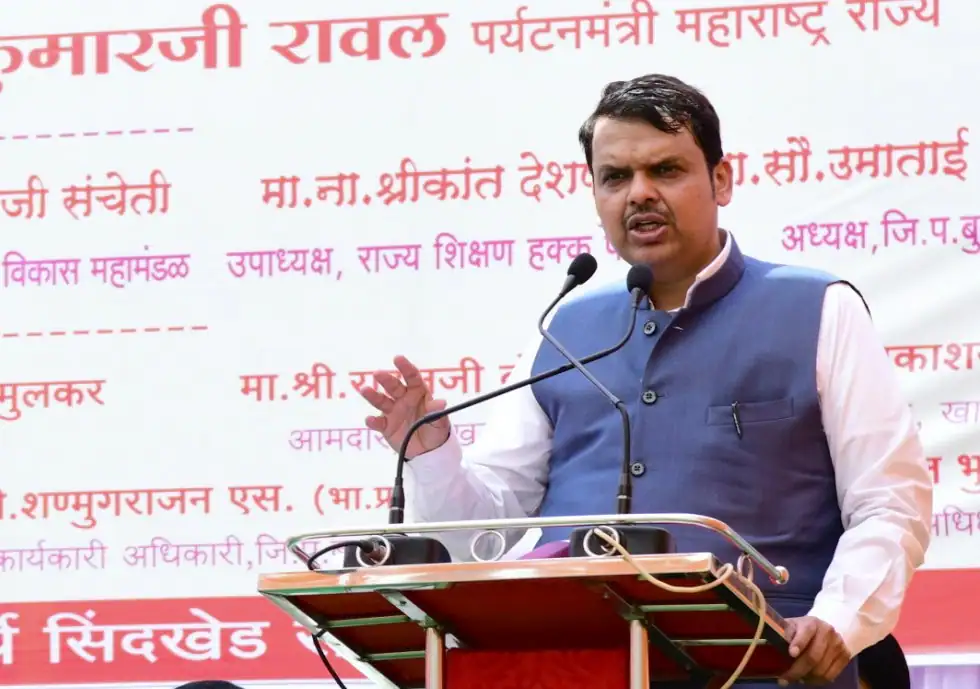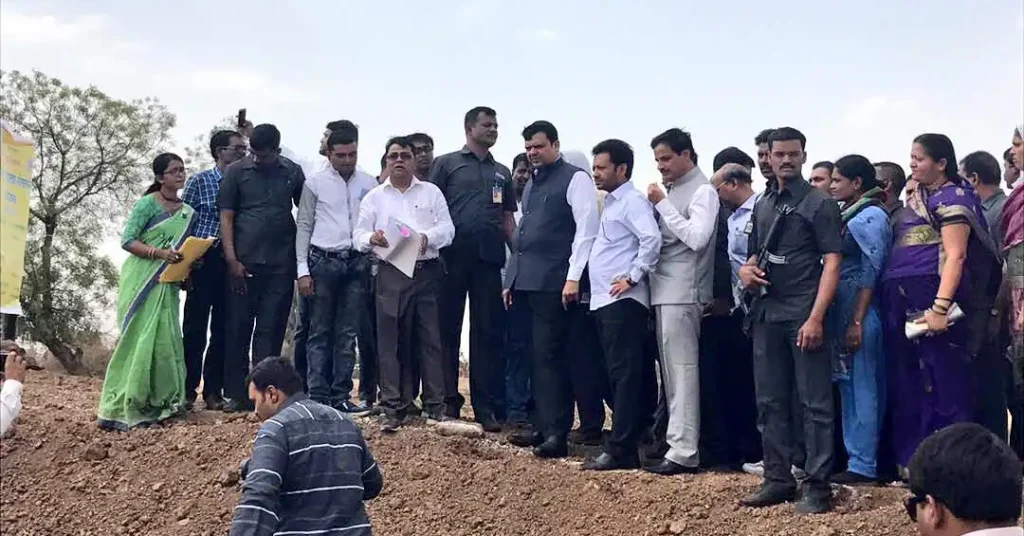JSA (Jalyukta Shiwar Abhiyan) is an extensive program that involves multiple measures to achieve water sufficiency in drought-affected areas of Maharashtra and improve agriculture and living conditions. The Magel Tyala Shettale Yojana, or Farm Ponds On Demand scheme, an important feature of JSA 1.0, also included in JSA 2.0, has contributed immensely to the cause by facilitating farmers with rainwater harvesting and irrigation.
Agriculture in Maharashtra is mostly rainfed. As a result, crop health is impacted by water stress, which occurs when temperatures are very high or dry spells are prolonged. Farm ponds can help during such times through protective irrigation of crops during their critical growth stages. Further, even during non-drought conditions, they may help with productivity.
After becoming the Chief Minister of the state in October 2014, Devendra Fadnavis identified the war against drought as his top priority since many parts of the state were reeling under severe drought. However, his approach was never to announce short-term measures like loan waivers to the farmers but to bring about a sustainable and permanent solution to the problem. He is always of the opinion that loan waivers and similar ad hoc measures only provide temporary relief to farmers, but their condition remains the same. Only a fundamental level drought eradication program with scientific backing can change the fate of agriculture in the state and improve the conditions of the farmers. JSA 1.0 was launched in January 2015, which emphasized rainwater harvesting and micro-irrigation by creating a network of water channels and discrete water storages and by desilting the existing nalas and ponds.
In line with the objectives of the JSA program, the Fadnavis government decided to undertake the Magel Tyala Shettale Yojana in December 2016 to encourage farmers to create individual capacity for rainwater storage and irrigation, supplementing the measures taken in the JSA scheme. It was decided to select 50000 farms in the first phase to provide financial assistance for digging ponds on their farmlands. Although a similar scheme was introduced by the previous government, Devendra Fadnavis didn’t hesitate to adopt it, as farm ponds are a proven method to help agriculture in the rain fed regions. Despite a fund shortage, he managed to arrange funds for the speedy execution of the scheme.

Advantages of firm ponds
Farm ponds offer significant opportunities to enhance the security of water for farming by capturing, storing, and distributing water for irrigation. These ponds can be replenished by rain and are strategically placed at lower elevations to gather runoff from higher areas after rainfall, a typical practice on farms. Additionally, ponds can be filled with water from irrigation runoff, which can then be reused. Sometimes farm ponds are connected to canals or streams through offshoot nalas to receive water from those sources as well, compensating for water level depletion during the dry season. Ponds have the ability to replenish groundwater, which helps retain more water within the system for an extended period. Ponds are also good for fish farming, fire protection, stock watering, or simply landscape beautification.
A detailed account of the Magel Tyala Shettale scheme
CM Devendra Fadnavis government appointed a private organization to evaluate the effect of the 90000 farm ponds that were made in Maharashtra during the Congress-NCP government between 2009-2012, under the National Agricultural Development Scheme and Employment Guarantee Scheme. Based on their positive report that the farm ponds were beneficial to the farmers during the kharif season, the Fadnavis government decided to adopt the same by the name of Magel Tyala Shettale Yojana. This decision of his set him apart as a leader who is compassionate and sincere to help farmers rising above politics.
The Magel Tyala Shettale scheme invited farmers to build farm ponds on their lands with the financial help from the government. As part of this program, farmers are offered assistance of up to Rs.50,000 or 70-75% of the cost of installing a pond, whichever is lower. In addition, a subsidy has been announced for the plastic sheet spread at the bottom of the shettale (farm pond).
51,500 farm ponds in the first phase
The Fadnavis government set a target of digging a total of 51,500 farms in the first phase during the year 2016-17. However, it was difficult to select the eligible farmlands from the 2,37,234 applications received. So the target figure was increased, and it was decided that the villages, which have received less than 50% rainfall in the last 5 years would be considered most eligible. Accordingly, 51,500 villages were selected from Nashik Revenue Division, 5287 from Pune Division, 16200 from Aurangabad, 13215 from Amravati, and 8478 from Nagpur. Some of the eligibility criteria included:
- The scheme allowed individual farmers or a group of farmers to make a common pond.
- The applicant needed to possess at least 0.6 ha of agricultural land, with no maximum limit.
- The location and the size of the shettale should be as prescribed by the government and must be approved by the agricultural department.
- Priority was given to the farmers who were BPL (Below Poverty Line) and an inheritor of a farmer who committed suicide.
The scheme was allocated Rs. 1000 crores for its implementation, as per the 2023 state budget, and the benefits for the selected farm ponds were directly transferred to the bank accounts of the farmers.
Terms and Conditions For Shettale
- The applicant should own a bank account in any nationalized bank and must submit a photocopy of his account details.
- Any advance payment will not be issued.
- The applicant farmer will be responsible for the maintenance and repair of the farm pond.
- The farm pond should contain an inlet and outlet facility.
Bodi instead of farms for East Vidarbha
The rice crop in East Vidarbha requires a protected irrigation system. For this, the state government gave permission to take new bodies instead of farms in the districts of Bhandara, Gondia, Chandrapur, Gadchiroli and also in Ramtek, Kamthi, Mouda, Parshivani, Kuhi, Umred and Bhiwapur talukas of Nagpur district through the government decision of 11 September 2016. For this, the department prepared the rules and fixed the subsidy amount according to the size of the bodi. Initially, the scheme was implemented only for families with suicides, or families below the poverty line.
Extension of the scheme to the entire state, including Konkan
Seeing the success of the Magel Tyala Shettale scheme, as the MLAs from Konkan started demanding the scheme be implemented in Konkan, the government was forced to change the rules in order to spread the scheme in other parts of the state. The state government increased the target of the Magel Tyala Shetale Yojana to 1,11,111 and ordered the implementation of this scheme across the state. Thus, the ‘Magel Tyala Shettale’ scheme was implemented in all but two districts of the state, Mumbai city and Mumbai suburbs.
Devendra Fadnavis has always maintained that development should not be superficial or temporary and should reach the lowest strata of people. Time and again, it has been proven that whenever a drought or flood situation occurred in the state, Devendra Fadnavis, whether in government or not, always suggested finding a comprehensive and permanent solution. To eradicate the drought situation, his government implemented large and famous schemes like the Jalyukta Shivar Yojana and Magel Tyala Shettale Yojana. At the same time, his government also worked extensively towards educating the farmers and changing their mindsets to improve the village economy.
Related Posts on X
Related Videos

